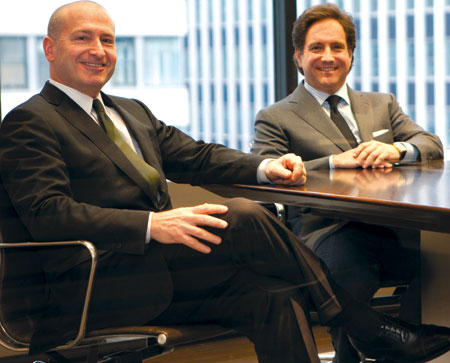
From left: Square Mile co-founders Craig Solomon and Jeff Citrin
In 2007, a little-known real estate fund called Square Mile Capital Management made $38 million in loans to Kent Swig, then a red-hot New York City real estate player, for him to complete his high-profile condo conversions at both the Sheffield and 25 Broad Street.
Square Mile forced Swig to pledge equity in his condos as collateral for the funds, but by 2008, Swig’s empire was beginning to crumble, and Square Mile moved swiftly to collect. The lender alleged that Swig not only defaulted on a loan backed by 25 Broad Street, but overstated his true investment in the Sheffield, constituting fraud.
Square Mile won a massive $28.4 million judgment against Swig and proceeded to shake down every asset he owned in New York.
For a firm that few ever heard of, Square Mile had notified the world who it was. In the few years since then, the lender, which was founded only five years ago in 2006, has only become more active on the real estate stage, and built on its reputation as a take-no-prisoners lender.
While it has had a few black eyes along the way (including at the former Verizon building in Lower Manhattan, and at the former Miraval Living condo on the Upper East Side), the firm has stayed active. To accomplish that, it’s focused most of its recent attention outside New York.
And the company’s battle with Swig may have helped define the post-Lehman era in New York real estate. Square Mile, sources say, set a precedent in this downturn for other private real estate funds in going after delinquent borrowers.
“They have a reputation for aggressively enforcing their rights,” said attorney Stephen Meister, a partner at Meister Seelig & Fine who represents investors Yair Levy and Serge Hoyda in an epic $60 million fraud lawsuit against Swig that is still winding through the court system.
Square Mile officials — without commenting specifically on the Swig case because it’s ongoing — said it’s their fiduciary responsibility to enforce their legal rights on these deals and protect the interests of their investors, which include a range of major institutions, from sovereign wealth funds to government pensions.
“Too often borrowers and counterparties confuse a win-win with a win for them,” Square Mile cofounder Craig Solomon told The Real Deal in an interview in the company’s Park Avenue office.
Indeed, Solomon, who cofounded Square Mile with Jeff Citrin in 2006, started out in the business during the downturn of the early 1990s, and learned a number of hard lessons about how to structure deals in a difficult economic environment.
“I think they’re pretty savvy in placing themselves in the right part of the capital stack in deals they think are attractive,” said Ben Thypin, senior analyst at Real Capital Analytics. “They want to make sure in the event there is a collapse they are not the ones to be completely wiped out.”
Attorneys with contacts
Citrin, a graduate of Dartmouth College and Columbia University Law School, comes from a background in real estate finance.
Before starting Square Mile, he was the founder and president of Blackacre Capital Management, the real estate investment arm of the Manhattan-based Cerebus Capital Management.
Under Citrin’s leadership, Blackacre completed several high-profile New York deals, including the 1998 acquisition of 111 Eighth Avenue (which was recently resold to Google), with Taconic Investment Partners and Goldman Sachs. He also was a partner in the 2002 development of Gateway Center, the groundbreaking shopping center in Brooklyn, under a venture with Related Companies.
Meanwhile, Solomon, who went to Lehigh University and the George Washington University School of Law, previously cofounded Solomon & Weinberg, a boutique Manhattan law firm specializing in commercial real estate deals.
The two began working together in 1992, when Solomon provided legal counsel on a deal Citrin was involved in. “The view then, as [it is] now, was to invest for superior risk-adjusted returns, and because we saw valuation going up, we saw ourselves investing in more senior positions in the capital structure,” Citrin said.

By the time they started Square Mile at the height of the market, the two had a vast network of contacts and investment partners.
In the five years since, they’ve grown Square Mile into a fund with more than $1.4 billion in debt and equity. They’ve expanded from their original offices in Greenwich, Conn., to 450 Park Avenue, and opened a West Coast headquarters in Los Angeles. By 2010, the company was completing its third real estate fund, an $806 million offering, called Square Mile Partners III.
When it first launched, Square Mile partnered with a wide range of players invested in outer-borough apartment buildings. But then it became more active in Manhattan. In one of its first major Manhattan deals, it teamed up with Taconic to buy a majority stake in the former Verizon building at 375 Pearl Street for $175 million. In a role reversal, the partners, who were the investors on this deal rather than the lenders, were recently forced to give the property back. But their relationship with Taconic is still strong.
“They’re smart, they’re creative …they’re just a very good team,” said Paul Pariser, Taconic’s co-chief executive. “Most of the deals I did with Jeff and Craig have been [grand] slam home runs.”
Both sides of default
Square Mile was a lender at 15 Little West 12th Street, where celebrity event guru Robert Isabell was planning a boutique office building and retail complex. In 2008, Isabell purchased an adjacent site at 837 Washington Avenue from James Ortenzio, the disgraced former state GOP head.
But in July 2009, before he won approval from the Landmarks Preservation Commission, Isabell, 57, died of a heart attack.
By September, Square Mile filed a $48 million foreclosure suit against the estate of Isabell. Then Square Mile and Taconic took over the property and began marketing the Little West 12th Street site on their own, with a pledge to share the proceeds with Isabell’s estate.
Taconic and Square Mile appear to have found success generating income at the property.
In October 2010, Palantir Technologies, a Palo Alto, Calif.-based software company, signed a 13,000-square-foot lease there, and upscale retailer Arhaus Furniture signed a 10-year lease for 32,000 square feet.
Meanwhile, Square Mile is also a joint-venture partner with Tishman Speyer at Two Gotham Center, a 21-story, $316 million tower in Long Island City that will house the city Department of Health. The project topped off this past spring and city workers have already started moving in.
Square Mile has, however, run into problems with some of its more high-profile New York investments.
In 2007, the lender was forced to recapitalize the struggling Miraval Living condominium at 515 East 72nd Street, and got caught up in an embarrassing dispute with Miraval Resorts, the building’s spa operator, over whether they failed to complete construction on time or whether Miraval placed unrealistic expectations on the New York condo market.
Square Mile declined to comment on the case, citing possible litigation between the parties. Miraval Resorts officials declined to comment.
Meanwhile, late last year, Taconic and Square Mile, which planned to remake the Verizon Building into a high-tech office complex, gave the property back to senior lender M & T Bank through a deed-in-lieu of foreclosure, a bank spokesperson confirmed.
Early last month, M & T entered an agreement to sell the property to Youngwoo & Associates and Seattle-based Sabey Corp. for more than $100 million. Youngwoo officials did not return calls for comment; however, Darcy Stacom, vice chairman of CB Richard Ellis, said the deal is expected to close by May.
Beyond New York
Perhaps chastened by some of their more recent struggles in New York, Citrin and Solomon say they’ve decided to focus their business outside the city, where the competition is a little less frothy.
In May, they won a Federal Deposit Insurance Corp. auction for a 40 percent stake in $421 million of assets belonging to Atlanta-based Silverton Bank, which failed in 2009. Square Mile paid 81 cents on the dollar for the loans, which included one backed by the W Atlanta Downtown, a 28-story hotel and condo.
The company beat out a number of high-profile competitors on the deal, including Starwood Capital and Colony Capital. As part of the loan sale, the FDIC holds a 60 percent stake and participates in the profits.
FDIC spokesperson David Barr said the federal agency was looking for a combination of “expertise with the assets and the sophistication to understand the risk of this type of transaction.
“What we’re trying to do here is recoup as much as possible for the creditors of the failed bank,” Barr said.
Square Mile started foreclosure proceedings on the W Atlanta Downtown in October, but has since worked out a deal with the borrower to restructure the debt.
That same month, it acquired 38 non-performing loans for $150 million under a joint venture with Ram Real Estate, a Palm Beach-based real estate fund. The loans were backed by 39 shopping centers across nine Southeastern states.
Casey Cummings, president of Ram, said several of the distressed loans are being worked out with borrowers, while a few others are being foreclosed on and repositioned.
He said Ram is planning joint acquisitions with Square Mile in the future, but declined to discuss specific deals.
Square Mile has entered other ventures beyond large pools of distressed loans as well.
In 2008, the firm formed a venture with the Davidson Hotel Co. to acquire the Sheraton Suites Tampa Airport/Westshore in Florida. The firms relaunched the 261-room property following a $14 million renovation.
Square Mile officials said their investors are looking for more aggressive returns that can only be achieved in a less competitive market than New York, where it sees pricing largely overvalued due to a large number of investors looking for deals.
“We can’t achieve those returns investing in fully occupied office space on Park Avenue,” said Solomon.
